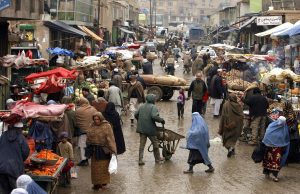Afghanistan may be independent, but is it free? It has a state, but does it have a nation? A nation-state is not just a territorial entity. It is also an idea, a habit, a lived experience. What is the idea of Afghanistan? When we speak today of Afghans desiring a progressive society and seeking to liberate themselves from the theocratic absolutism of the Taliban, whose story are we telling? Conversely, when we consider that many among the Taliban are not simply armed insurgents, equipped with a template of hatred by a neighboring state, but also an alienated constituency defending traditional Pashtun values, Islam, and their village identity, whose views are we representing? And when President Ashraf Ghani wrote, in 2018, about a ceasefire with the Taliban demonstrating the strength of Afghan national identity, which identity did he refer to?
During the last 100 years, Afghan elites faced the fundamental dilemma of how to develop a coherent national identity that would unite the diversity of Afghanistan. They sought to devise ways to represent Afghans who were always someone else, too: Tajiks, Hazaras, Uzbeks, Aimaks, non-Muslims. Despite the differences in the contexts that they inhabited, these elites indulged the same ambition: to create a political order that would be singular enough to unify all Afghans, yet plural enough to accommodate and reconcile their internal divisions. The elites deployed several ideological blueprints: secular-nationalism under Amanullah Khan, constitutional monarchy under Zahir Shah, reformist-socialism under the People’s Democratic Party of Afghanistan (PDPA), theocratic dictatorship under the Taliban, and electoral democracy under Hamid Karzai and Ashraf Ghani. They drafted constitutions, provided mass education, expanded the road network, invoked religion, invited celebration of national holidays, and orchestrated numerous radio programs. They thus sought to alter the social fabric of Afghanistan.
As these elites faced opposition to their reforms from competing political orders of religion, ethnic allegiances, and tribal loyalties, they retreated from their script. They started defining the Afghan nation exclusively in their own image. In doing so, these self-absorbed elites succumbed to the false comfort of a singular, uncontested, immutable national identity instead of entertaining diverse, often competing, versions of Afghan identity. Conceptions of national identity are, however, rarely fixed and unchangeable. National identity is a form of an evolving narrative, a continuous exercise in story telling about who “we” are and aren’t. These conceptions and narratives are fashioned and refashioned to accommodate the myriad of aspirations in a population.
Unlike what any of these elites imagined, the idea of Afghanistan is inherently pluralistic. It includes contradictions and collusions that have intensified through the different political transitions and experiments. Its imaginative potency resides in its ability to bring contending voices together.
There is an Afghan who is inspired by trajectories of Western modernity. She seeks to challenge, if not confront, traditional structures rooted in ideas from the past. Her image of the country’s history is colored by the future that she imagines for Afghanistan. Having acquired education abroad, she now has the language to engage those with access to power in Kabul.
There is another Afghan who experienced war, is embedded in the village life, and who feels insulated from the tidal waves of globalization that now engulf the country. He feels trapped between traditions that serve only moral purposes and are irrelevant for material ends, and a modernity for which he is unprepared.
There is yet another Afghan, who, disenfranchised by the post-2001 political configuration, witnesses the steady reduction of Afghan democracy to a menacingly narrow concept of elections. He resorts to the language of violence to register his dissatisfaction. Disillusioned with the gradual transition of political power from social hierarchies toward the centralized state in Kabul, he seeks refuge in the reasoning and resources of fellow disgruntled Afghans with a declared urge to remoralize politics.
Each of these Afghans seeks to “take back” their country — from the clutches of gloomy tradition and religion that have historically held progress hostage; from the influence of radical modernity and secularism that have selectively enabled a few Afghans to dominate narratives of their country’s past and future; and from the theoretically appealing yet exclusionary scaffoldings of the modern democratic political order. Each seeks to have an answer to the country’s continual plight: to impose a singular, unalterable, ineffaceable Afghan-ness to the identity of an Afghan.
Prakhar Sharma is a Ph.D. Candidate in Political Science at Maxwell School, Syracuse University. He is writing his dissertation on the evolution of nationalistic discourse in Afghanistan (1918-2018).

































